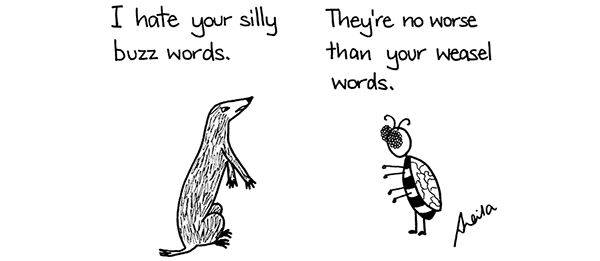Introduction
In the realm of decision-making, the mental model of Weasel Words holds significant relevance. Weasel words refer to ambiguous, vague, or misleading language that allows speakers or writers to create an impression of credibility or certainty without making concrete claims or commitments. This blog post explores the concept of Weasel Words, its impact on decision-making, and its prevalence in personal life decisions, business scenarios, and public policy-making. We will delve into the mental biases that contribute to the use of Weasel Words, provide practical strategies to identify and overcome this fallacy, and emphasize the value of awareness and active avoidance of this cognitive trap.
Understanding Weasel Words
Weasel Words are deceptive linguistic devices used to manipulate perception, evade responsibility, or create an illusion of credibility. They exploit the inherent ambiguity of language to mislead or deceive the audience. By employing Weasel Words, individuals or groups can make statements that seem significant or authoritative while avoiding concrete claims or commitments.
Relevance in Decision-Making
Weasel Words have a profound impact on decision-making processes. When faced with vague or misleading language, individuals may make decisions based on false assumptions, incomplete information, or misplaced trust. By recognizing and understanding Weasel Words, we can safeguard ourselves from making irrational decisions that are contrary to our best interests.
Anchored in Human Psychology
The prevalence of Weasel Words in our day-to-day lives can be attributed to various psychological factors:
- Ambiguity Aversion: Human beings have a natural tendency to avoid ambiguity and seek clarity and certainty. Weasel Words exploit this aversion by providing a semblance of certainty without making explicit claims, appealing to our desire for reassurance.
- Confirmation Bias: Weasel Words can tap into confirmation bias, the tendency to seek information that confirms our preexisting beliefs or expectations. By using ambiguous language, individuals or groups can make statements that allow people to interpret them in ways that align with their own biases.
Examples of Weasel Words in Various Contexts
- Personal Life Decisions: Imagine a situation where an advertisement for a weight-loss product claims to provide “up to 10 pounds of weight loss.” The use of the phrase “up to” creates ambiguity, allowing the product to make exaggerated claims without providing a specific guarantee.
- Business Scenarios: In business, a company might promote its product as “clinically proven to reduce the appearance of wrinkles.” The phrase “reduce the appearance” leaves room for interpretation, giving the impression of efficacy without explicitly claiming wrinkle reduction.
- Public Policy-Making: Politicians may use phrases like “many experts agree” or “studies show” when presenting their policies or arguments. These vague statements create an illusion of consensus or scientific support without providing specific sources or evidence, influencing public opinion.
Understanding the Psychological Underpinnings
The use of Weasel Words is intertwined with various cognitive biases:
- Ambiguity Effect: The ambiguity effect describes how individuals tend to favor options with known probabilities over ambiguous options. Weasel Words exploit this bias by providing an illusion of certainty, making vague statements more appealing.
- Anchoring Bias: Weasel Words can leverage anchoring bias by establishing an initial vague statement that sets the stage for subsequent interpretation. By starting with an ambiguous assertion, individuals are more likely to accept subsequent claims that align with their initial understanding.
Strategies to Overcome Weasel Words
To avoid succumbing to the influence of Weasel Words, consider the following strategies:
- Develop Critical Thinking Skills: Cultivate a habit of questioning and scrutinizing statements, especially when they contain ambiguous or vague language. Seek evidence, demand clarity, and challenge assumptions.
- Be Wary of Absolute Terms: Pay attention to absolute terms like “always,” “never,” or “everyone.” Such words often oversimplify complex issues and may indicate the presence of Weasel Words.
- Seek Specificity and Concrete Claims: Encourage individuals and groups to provide concrete evidence and precise claims instead of relying on vague assertions. Requesting clarity can help unveil hidden agendas and expose the use of Weasel Words.
Conclusion
Weasel Words can significantly impact decision-making processes by misleading and manipulating our understanding of statements and claims. By recognizing the prevalence of Weasel Words in personal, business, and public policy contexts, understanding the psychological biases that contribute to their effectiveness, and employing strategies to identify and overcome them, we can make more informed and rational decisions. Awareness and active avoidance of Weasel Words are key to maintaining a critical mindset and ensuring that our choices align with our best interests. Let us strive for clarity, demand evidence, and navigate the realm of language with vigilance, ultimately leading to more objective and sound decision-making.
